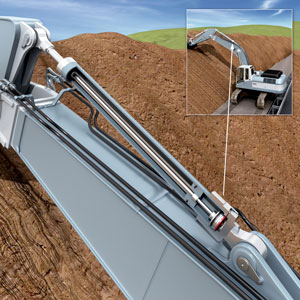SICK has expanded its MAX® family of linear encoders to extend the space-saving, operating cost and maintenance benefits offered by its innovative magnetostrictive measurement technology to smaller hydraulic cylinders and more harsh operating environments.
The rugged SICK MAX30 and SICK MAX48 linear encoders use reliable, non-contact magnetostriction technology to measure the piston position in the hydraulic cylinders widely used in industrial, materials handling and agricultural vehicles. The SICK MAX encoders offer compact integration benefits for new machinery designs. They also provide an opportunity for end users to upgrade to more rugged performance and diagnostic feedback through quick and easy retrofit into existing cylinders.
The SICK MAX30 is believed to be the smallest in-cylinder magnetostrictive linear encoder on the market, with a head dimension of 30mm x 35mm, extending the innovative MAX® positional feedback technology to smaller cylinders with more limited space. OEMs therefore have new opportunities to take advantage of the SICK MAX’s highly-reliable, contactless and wear-free positional accuracy, including in axes with lower operating forces. This enables them to be installed into material handling machinery such as mobile cranes, reach stackers and lift trucks, for example in outrigger cylinders, lift and tilt cylinders and steering systems.
The new SICK MAX48A introduces a highly-durable full stainless-steel enclosure and axial wire orientation to extend the benefits of the popular 48mm SICK MAX48 linear encoder to the harshest industrial operating environments.
Space-Saving Benefits
Darren Pratt, SICK’s UK product manager for encoders, explains: “Ever since SICK’s MAX48 was launched in 2017, cylinder manufacturers have welcomed its ability to achieve a longer usable piston stroke length within the tight space of a standard-sized hydraulic cylinder due to its smaller damping zone. This space-saving benefit enables, for example, a greater useful reach for a hydraulic arm with several cylinders.
“The MAX30’s installation depth is considerably smaller than for competitive units. So, a MAX encoder could deliver up to 10% more travel in a cylinder with a stroke of 300-400mm, for example. The SICK MAX®’s innovative design concept means there is no need to fit a spacer when assembling the magnet in the piston, making installation easier and less prone to assembly errors.”
Built-in Diagnostics
All SICK MAX® linear encoders feature built-in diagnostics to record data for preventative and predictive maintenance, enabling, for example, analysis of operating cycles and the determination of operating limits. This diagnostic information provides data to machinery control systems to ensure performance, safety and reliability in machine operation and maintenance. End users can easily incorporate the instrumented cylinders in existing systems to maximise machine availability and avoid costly unplanned downtime.
The SICK MAX30 is suitable for smaller cylinders with piston diameters of 30mm or more and piston rod diameters of 20mm or more. Maximum stroke length for the MAX48 is 2500mm, while the MAX30 is available with stroke lengths up to 1500mm; any length can be specified upwards from 50mm in 1mm intervals.
Rugged Performance
All the SICK MAX® encoders give a resolution of 0.1mm and repeatability of ±0.2mm. Because of the sensing technology employed, the encoders give absolute position data, so there is no need for a teach-in at start-up.
All the encoders are resistant to shock and vibration and operate in fluid temperatures of -30oC to +95oC. Excellent EMC (electromagnetic compatibility) performance helps to boost reliability, even when used close to high-powered electrically ‘noisy’ equipment such as motors. Provided a suitable electrical connector is used, MAX® linear encoders are protected against the ingress of dirt and moisture to IP69K.
Positional data can be output via a choice of analogue formats (V DC or mA), PWM, and CANopen and SAE J1939 industry-standard digital protocols.
